McLook
 I found the article below on a website called rugbybetting.com (See the Link to the original Article by clicking HERE). The article is actually not about betting. It put the racial policy of SA rugby within context of the World Rugby rule book. Interesting perspectives. I thought the rugby-talk readers might enjoy this.
I found the article below on a website called rugbybetting.com (See the Link to the original Article by clicking HERE). The article is actually not about betting. It put the racial policy of SA rugby within context of the World Rugby rule book. Interesting perspectives. I thought the rugby-talk readers might enjoy this.
The World Rugby (formerly known as the IRB) rule book on racial discrimination reads as follows:
In terms of By-Law 3 of the IRB rules and regulations, the IRB is compelled to prevent any form of racial discrimination in rugby. IRB Regulation 20 also stipulates that any action which may be construed as racial discrimination will be regarded as misconduct. In terms of By-Law 7, not only is a country’s international team bound to this; the provincial rugby unions resorting under a country’s board must adhere to these principles as well. In terms of By-Law 9.4(r) the IRB may institute disciplinary steps against any rugby body that violates these rules.
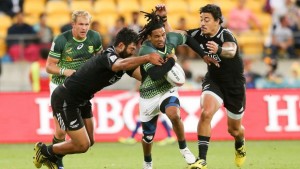
Rosko Specman
Latest news on the Wellington Sevens Final is that referee Matt O’Brein has now apologized for his officiating during the Final. Too little too late, one feels. On the positive side it can only be good for the game if referee’s man up after the match. I also like Neil Powell’s handling of the situation, in terms of his communication with the referee, players and media.
The article below was published on stuff.co.nz earlier today.
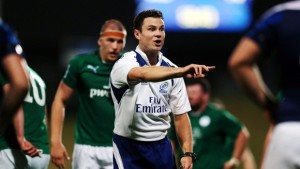
Matt O’Brien during the Wellington Sevens final
In a recent article published on stuff.co.nz, sport scribe Mark Reason ripped into referee Matt O’Brien’s officiating during the Wellington Sevens Final between South Africa and New Zealand.
The article below was published on stuff.co.nz yesterday.
New Zealand won the Wellington leg of the Sevens championship, after a nail biting finish, beating South Africa 24 / 21 in the Final.
OPINION: Brendan Venter, the former Springbok centre and current technical director of Saracens, has called for an investigation. And it is not cricket in Mumbai or tennis in St Petersburg that Venter is concerned about, but rugby in Wellington, the home of the New Zealand Rugby Union.
The Springboks are outraged by both the refereeing of their Pool match and their Final against New Zealand at the Wellington Sevens and while it may go against the grain to feel empathy with a South African rugby supporter, they have a point. Continue reading
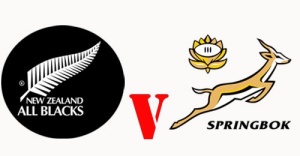 I must admit I was (and still am) furious about the Springbok loss in the last minute of the match last week against the Wallabies from Australia. Specially with the constant box kick tactics.
I must admit I was (and still am) furious about the Springbok loss in the last minute of the match last week against the Wallabies from Australia. Specially with the constant box kick tactics.
I hate losing but can accept it if the team plays proper rugby. I get furious when the team plays below potential because they are too scared or too careful. I thought that the Springboks played below what they are capable of, last week.
I am not a fan of kicking your possession away.
I played for the university Under 20 team in the 1980′s mosly as flyhalf and inside centre, in a time when Naas Botha was the ‘role model’ of flyhalf play in South Africa. I worked hard at my kicking game because Naas sort of set the template for flyhalf play in those days, but rarely kicked in matches because I just disliked the idea of kicking hard earned possion away. Nevertheless, I scored or created tries on occasion by utilzing the high kick and charge.

 The 1994 Springbok team is regarded as the worst Springbok side visiting New Zealand. They were unable to win a single test –losing the first two and drawing the 3rd test- and losing one provincial match out of 11 against Otago (12-19).
The 1994 Springbok team is regarded as the worst Springbok side visiting New Zealand. They were unable to win a single test –losing the first two and drawing the 3rd test- and losing one provincial match out of 11 against Otago (12-19).
In total they lost 3 matches and drew one out of 14 matches. Compared to the 1965 Springboks probably a better overall result; excluding the fact that they couldn’t win a test match. It was nonetheless a disappointing result considering the fact that this team also completed tours -with the same coach, Ian McIntosh- through Australia and Argentina in 1993. They won one test in Australia and both test matches in Argentina with reasonable good margins. In addition they played two test matches against England at the start of the 1994 season losing the first one 15-32 at Loftus Versfeld and winning the second one 27-9 at Newlands in Cape Town. From that backdrop there was understandingly an expectation that SA rugby and particular the Springboks will shed the impact of the isolation years and begin to adjust to the requirements of the international rugby if not win test matches.

 All Blacks 11 / 5 Springboks (Eden Park, Auckland 1 September 1956)
All Blacks 11 / 5 Springboks (Eden Park, Auckland 1 September 1956)
Ron Hemi:“The fourth test was the hardest game I ever played in, and this was at a time when I considered myself to be at peak physical fitness. South Africa made a big mistake in the selection of their first five-eighth and fullback. Bill Clark and Ross Brown were able to box in Howe and kill play close in, preventing the South African outside backs from operating. And a more determined fullback than Viviers would have prevented Jones’s try. The New Zealand tactics of bursting around the rucks, the ball being kept at close range in front of the forwards, was the winning formula.”

 It is the uncertainty factor that produces the biggest satisfaction and enjoyment in sport. That uncertainty; brought about by not being sure whether you’ll be able to be victorious or not. That’s why as athletes and human beings we seek and thrive on competition. We find it in challenging ourselves to complete a marathon or to play against individuals or teams with higher rankings. That’s why as nations we play test matches and why even in test matches we want to compete against the very best.
It is the uncertainty factor that produces the biggest satisfaction and enjoyment in sport. That uncertainty; brought about by not being sure whether you’ll be able to be victorious or not. That’s why as athletes and human beings we seek and thrive on competition. We find it in challenging ourselves to complete a marathon or to play against individuals or teams with higher rankings. That’s why as nations we play test matches and why even in test matches we want to compete against the very best.
It is sort of boring to play against a team that you know you are going to win. The uncertainty factor is absent and therefore also the real joy in the victory.
I’ve been living in NZ now for 12 years and for only the second time in 12-years there is a real uncertainty in Kiwi land about a test match against South Africa. The last time was in 2010 after the 2009 Springbok victory in Hamilton. The uncertainness in 2010 was not because it was felt that SA played good rugby but because there was uncertainness about the All Black team’s ability to handle the box kick and Matfield in the line-out.
 Last week I lamented about the lack of presence, urgency and innovation in the Springbok team when they played the Pumas in Mendoza. I concluded that on evidence of the lack of presence of the tight five and the slowness of the back row, I can’t see them winning in Brisbane.
Last week I lamented about the lack of presence, urgency and innovation in the Springbok team when they played the Pumas in Mendoza. I concluded that on evidence of the lack of presence of the tight five and the slowness of the back row, I can’t see them winning in Brisbane.
The Springboks corrected all those shortcomings this weekend in Brisbane. The result – the greatest ever victory in Australia and the first win in Brisbane in 41 years.
Here is my list of things that really impressed me in this Test followed by a list of things I think they need to work on before they tackle the All Blacks at Edenpark.
 I do think the SA rugby public is sometimes a little unrealistic if not arrogant with their expectations regarding Springbok rugby.
I do think the SA rugby public is sometimes a little unrealistic if not arrogant with their expectations regarding Springbok rugby.
Part of the Springbok success story is certainly the high expectations so one does not want to make excuses for average performances.
Make no mistake the Pumas is a handful at home. Not only passionate but they also have a very destructive style. There is a lot of niggle; a lot of in your face; substantial clever obstruction and push and shove stuff off the ball. A few years back the All Blacks almost lost a match against the Pumas in South America.
 South Africa 17 / 6 Bay of plenty-Thames Valley-Counties
South Africa 17 / 6 Bay of plenty-Thames Valley-Counties
It was the last midweek match of the tour with only the 4th test remaining. The opposition was a combination of 3 relatively weak sides namely Bay of Plenty (who won only 1 of 5 matches played in the 1956 season); Thames Valley (who won only 3 of 8) and Counties (a team founded as South Auckland in 1926 and who won only 2 of 13 season games in 1956). These three teams combined for the first time in 1956 and played 2 warm-up games namely against Auckland (7th of August 1956 losing 6-7) and Waikato (11th of August 1956 losing 6-24) in preparation for the Springboks.
 It was the Springboks’ best performance of the tour. A real confidence booster after the shock defeat against the University side but at the same time a game that had a negative impact in more than one way. It showed New Zealand the danger of allowing the Springboks space to play the Craven-linking pattern. Not that New Zealand was unaware of the Springbok style but it re-affirmed the necessity of keeping the Springboks on the back foot.
It was the Springboks’ best performance of the tour. A real confidence booster after the shock defeat against the University side but at the same time a game that had a negative impact in more than one way. It showed New Zealand the danger of allowing the Springboks space to play the Craven-linking pattern. Not that New Zealand was unaware of the Springbok style but it re-affirmed the necessity of keeping the Springboks on the back foot.
 Noticeably, conversation about the 1956 tour always detour to the match against the New Zealand Universities. Historically, it was the first time a New Zealand University team played against an international touring side but this match is synonymous with the 1956 tour for other reasons. The fact that the Universities team won is also not really the main reason why Kiwi’s still rate this match as the best match of the tour. It was the manner in which the Universities team won that delighted the New Zealand rugby fraternity. All the good football came from the home side. The backs demonstrated opportunism, sensible anticipation and application while the pack totally dominated proceedings. The game is nevertheless mostly remembered as the game of the great Ron Jardon ‘try-that-wasn’t’. A great howl went up in protest when Jardon was called back after a spectacular 65 meter run through almost the entire Springbok team (listen to Winston McCarthy highlights of the match here) and old-timers almost without exception still mention the Jardon try to this day whenever the 1956 tour are under discussion.
Noticeably, conversation about the 1956 tour always detour to the match against the New Zealand Universities. Historically, it was the first time a New Zealand University team played against an international touring side but this match is synonymous with the 1956 tour for other reasons. The fact that the Universities team won is also not really the main reason why Kiwi’s still rate this match as the best match of the tour. It was the manner in which the Universities team won that delighted the New Zealand rugby fraternity. All the good football came from the home side. The backs demonstrated opportunism, sensible anticipation and application while the pack totally dominated proceedings. The game is nevertheless mostly remembered as the game of the great Ron Jardon ‘try-that-wasn’t’. A great howl went up in protest when Jardon was called back after a spectacular 65 meter run through almost the entire Springbok team (listen to Winston McCarthy highlights of the match here) and old-timers almost without exception still mention the Jardon try to this day whenever the 1956 tour are under discussion.
 We’ve all heard it – defence wins rugby matches. Simply, defence forces mistakes and mistakes leads to tries for the defending team. Frankly, my opinion is: ‘defence is just another expression of SA rugby’s obsession with safety first’.
We’ve all heard it – defence wins rugby matches. Simply, defence forces mistakes and mistakes leads to tries for the defending team. Frankly, my opinion is: ‘defence is just another expression of SA rugby’s obsession with safety first’.
For SA it’s about Low risk rugby.
Traditionally, Springbok teams (and Super Rugby teams) have a low risk approach expressed as 10-man set piece rugby; kick and charge or soften-up first before moving the ball through the hands.
 After the trails for the selection of a Springbok side to tour the United Kingdom in 1931 the general feeling among selectors was that another equally strong Springboks side could easily be selected. That is a second Springbok team of almost equal ability that could potentially challenge if not beat the side that was selected to tour.
After the trails for the selection of a Springbok side to tour the United Kingdom in 1931 the general feeling among selectors was that another equally strong Springboks side could easily be selected. That is a second Springbok team of almost equal ability that could potentially challenge if not beat the side that was selected to tour.
A tour was consequently arranged for these unlucky players to Argentina and the team was officially called the Gazelle. This tour took place in 1932 under the management of Paul Roos and the captaincy of Joe Nykamp. The side consisting of uncapped players wore blue shirts emblazoned with springbok head, red stockings and white shorts. They played eight matches; won all of them and scored 269 points with only 24 points scored against them. The two matches against a representative Argentinian side the Gazelles won 42-0 and 34-3 respectively. Gimnasia y Esgrima, a club coached and captained by B.H Heatlie gave the South African Gazelles stern opposition and lost by only 11-5 in the last game of the tour. Heatlie was the man who captained South Africa in their first ever international against a British touring side.
 Round 3 of Super Rugby of 2013 certainly delivered it’s share of surprises, frustration, disapointment, elation and joy.
Round 3 of Super Rugby of 2013 certainly delivered it’s share of surprises, frustration, disapointment, elation and joy.
Here’s having a disection of a number of the games:
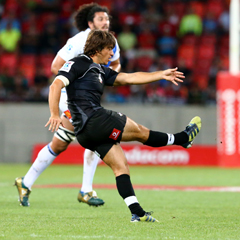 Expecting the worst, I was reluctant to the point of rather snooze off in front of the TV when the Southern Kings vs Western Force match started at 06:00 this morning in New Zealand.
Expecting the worst, I was reluctant to the point of rather snooze off in front of the TV when the Southern Kings vs Western Force match started at 06:00 this morning in New Zealand.
The first 10 minutes was not encouraging at all with the Kings hardly seeing the ball. On the brink of switching the TV off, the Kings scored the first try of the match. Intrigued I started to watch, with more interest and what a delight it turned out to be.
SuperBru points in the back of my mind, I was not concerned about them losing. So I kept on watching not because they were edging ahead and eventually winning but because of the delightful rugby they dished-up.
The defence was good, the set piece solid (mostly), the line-out better than the Stormers on the weekend and the ball handling in the backline refreshing and full of variation. There was some enchanting inter-passing between forwards and backs, good hands, nice light touches and good decision-making when they carried the ball. Some exciting new talent was on display as well on the wing with Sergeal Petersen. Demetri Catrakilis had an impressive game at flyhalf. Seems that we have a wing here that could be a Springbok in the making and Catrakilis impressed as a flyhalf that can dictate as well as play the running game.
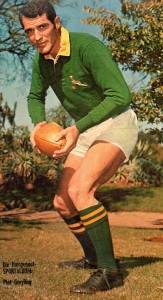
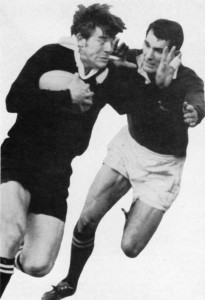 After my tribute to Jan Ellis I thought I just have to write something about the man who was a big part of Jan’s success as a Springbok rugby player, Piet Greyling.
After my tribute to Jan Ellis I thought I just have to write something about the man who was a big part of Jan’s success as a Springbok rugby player, Piet Greyling.
Currie Cup-winning Transvaal captain in 1971 and 1972, former Springbok flanker Piet Greyling, was arguably one of the best, but certainly one of the toughest.
The picture below shows Piet Greyling with his Transvaal side who got a share of the Currie Cup for the first time in 19 years – having previously won it in 1952 – when they shared the cup with Northern Transvaal in an epic final and controversial 14-14 draw at Ellis Park in 1971. The next year Greyling led his Transvaal side to a 25-19 win over Eastern Transvaal at Pam Brink Stadium in Springs to win the cup with the help of Gerald Bosch who dropped the winning points in the final minutes. It was back in 1972, before the Currie Cup final against Eastern Transvaal in Springs that the former Bok captain uttered these famous words to his Transvaal team-mates: “Eighty minutes of agony for an eternity of pleasure.”
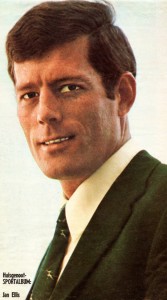 With the news this week that Springbok great, Jan Ellis, passed away at the age of 71, I just had to write this tribute to Jan.
With the news this week that Springbok great, Jan Ellis, passed away at the age of 71, I just had to write this tribute to Jan.
Jan Ellis personifies Springbok rugby for me. It has been said that as humans we think in pictures. When we think of something we see a picture of some sorts and this picture can differ from one person to the next, which is why we sometimes voice the same words but come up with different understanding or meaning. The best communicators are those who can create clear and vivid pictures in the mind of his listeners.
When I think of Springbok rugby I see Jan Ellis. Hard, uncompromising, fast with a touch of artistic moodiness and flair but with relentless motivation to succeed based on a staunch work ethic and absolute conviction of what is right and wrong – that is Jan Ellis in a nutshell, for me.
So, I don’t see all that, I just see pictures of Jan Ellis flashing through my mind.
(see the photo gallery I’ve created of Jan Ellis here).
The analogy between the Springboks and Jan Ellis, for me, came along probably because I had so many pictures of Jan Ellis when I started with my sampling of rugby pictures in 1970. I was born in Windhoek, South West Africa (now Namibia) and Jan was SWA’s second Springbok, the first being Sias Swart.
 The 1974 Tour of the Lions to South Africa was undoubtedly the most unsettling tour ever for Springbok rugby. Touring unbeaten through South Africa superior in every aspect in virtually every single match including the test matches it was a massive wake-up call for South African rugby.
The 1974 Tour of the Lions to South Africa was undoubtedly the most unsettling tour ever for Springbok rugby. Touring unbeaten through South Africa superior in every aspect in virtually every single match including the test matches it was a massive wake-up call for South African rugby.
I was 12 years old when this tour eventuated. In my mind at that time the Springboks had an aura of invincibility. I was too young to know about the 1956 and 1965 tours as the patriotic Afrikaans media did not write much about it. The country was still in euphoria after the 1970 victory over Lochore’s All Blacks and the unbeaten 1971 tour to Australia. It was never said in so many words but generally the 1972 loss against England was seen as just a hiccup; a fleeting glitch due to team selections and underestimation of the opposition.
 First match: 15 May 1956 – Canberra
First match: 15 May 1956 – Canberra
South Africa 41 / Australian Capital Territory (ACT) 6
Promoting rugby union was paramount in Australia when the Springboks arrived in 1956. Consequently -soon after arrival- at a civic reception at the Sydney Town Hall Danie Craven and Basie Viviers promised to play open attractive rugby to help rugby union in their battle for player volume against rugby league.
The team travelled to Canberra for the first match against an Australian Capital Territory team. This match was not part of the original tour itinerary and was arranged as a tribute to the resolute efforts of local administrators to gain footing for union rugby in an area with a population basis slightly bigger than Paarl in Cape Province, South Africa.
 All credit to New Zealand for not blaming the virus in the team or end-of-year-tiredness for their loss at the hands of a committed England team.
All credit to New Zealand for not blaming the virus in the team or end-of-year-tiredness for their loss at the hands of a committed England team.
The All Blacks players looked more than a bit pale and lethargic as they entered the field and even the Haka lacked its normal spark.
Punctiliously I don’t however think it was either the virus or tiredness that saw the All Blacks lose this match. It was the England tactics and their good defence that won them the match.
 Nick Mallet during his tenure as Springbok coach made himself very unpopular by saying that he is not too concerned about criticism from South African rugby fans because in his opinion they don’t know much about the game anyway.
Nick Mallet during his tenure as Springbok coach made himself very unpopular by saying that he is not too concerned about criticism from South African rugby fans because in his opinion they don’t know much about the game anyway.
 What the hell is going on with our beloved Springboks? I believe this is the main question every SA rugby supporter wrestles with at this moment!
What the hell is going on with our beloved Springboks? I believe this is the main question every SA rugby supporter wrestles with at this moment!
Wrong players in key positions, an unbalanced back row, injuries to key players and playing an outdated game plan has all been voiced as probable reasons.
Heyneke has responded to most of these criticisms by making changes to the team but still the team seems to be tentative and almost scared to do anything. They played like a golfer obsessed with his golf swing, so focussed on getting it exactly right that he forgets to hit the damn ball. The ‘Boks in the first half was overly careful, almost scared that they would make mistakes (not getting it exactly right). The result of that –and it has been the case in some of The Rugby Championship test matches as well- was that they became tentative and pedantic when going into contact.
Third Test – Lancaster Park, Christchurch, 18 August 1956
New Zealand 17 / South Africa 10
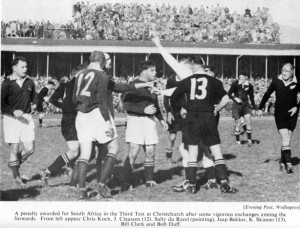 Skinner: “From what I’ve read over the years you’d have thought the fighting in that third test lasted the entire game, but that simply wasn’t true. There were only two punches – one that floored Koch and the one that stopped Bekker.”
Skinner: “From what I’ve read over the years you’d have thought the fighting in that third test lasted the entire game, but that simply wasn’t true. There were only two punches – one that floored Koch and the one that stopped Bekker.”
Don Clarke: “Kevin Skinner is quite a modest man but I saw his knuckles after the match.”
 Media reports are quick to plug that the Springboks have never lost to the Pumas.
Media reports are quick to plug that the Springboks have never lost to the Pumas.
However I can still remember the day in 1982 when Hugo Porta’s South American team, the Jaguars, gave the Springboks a hiding 21-12 with Porta scoring all his team’s points by running in a try, kicking a drop goal, and slotting a few penalties and a conversion.

 Brian O’Driscoll said after the 3rd New Zealand/Ireland test match that speed at the ruck is what matters most and that the scoreboard reflect (60-0 for the All Blacks) in essence what happened at the breakdowns.
Brian O’Driscoll said after the 3rd New Zealand/Ireland test match that speed at the ruck is what matters most and that the scoreboard reflect (60-0 for the All Blacks) in essence what happened at the breakdowns.
McCaw on questioned what did the AB’s rectify, after the second test, to produce the marked improvement in the All Blacks game said: “We kept our line better and were more successful (as compared to the second test) to create forward momentum at the rucks”.
Taranaki 3 / 3 South Africa – 11 August 1956, Rugby Park New Plymouth
 The Springbok team arrived in New Plymouth in high spirits after winning the second test and constructing an impressive win against Wanganui – scoring 7 splendid tries. There was a feeling in the camp that the tour was back on track and that the team was starting to hit form. The struggling performance against a spirited Taranaki team therefore came as a bit of a shock; a reality check.
The Springbok team arrived in New Plymouth in high spirits after winning the second test and constructing an impressive win against Wanganui – scoring 7 splendid tries. There was a feeling in the camp that the tour was back on track and that the team was starting to hit form. The struggling performance against a spirited Taranaki team therefore came as a bit of a shock; a reality check.
Within context of the tour it was a match as important and influential as the Waikato game. The spirit, commitment and overall performance of the Taranaki team showed the way for the All Blacks according to Terry McLean and this had a highly significant influence on the outcome of not only the third test but also the series:

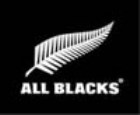 There are a host of international teams like Scotland and Ireland not even to mention second tier test nations like Canada, USA, Italia and Argentina who have never beaten the All Blacks.
There are a host of international teams like Scotland and Ireland not even to mention second tier test nations like Canada, USA, Italia and Argentina who have never beaten the All Blacks.
Wales have beaten the All Blacks only three times, the last time being in 1953. In general the only teams really able to foster some occasional wins against the All Blacks are England, France, Australia and South Africa with the latter being by far the most successful in this regard.
The fact that Rhodesia (now of course Zimbabwe) have once beaten the All Blacks are therefore something really unique and says a lot about the state of rugby in Southern Africa at the time this occurred namely in 1949. The fact that South Africa also white washed the 1949 All Blacks 4-0 in the test series leaves the impression that it was a weak All Black side which is something most rugby scribes strongly reject.
 Over the past weekend, one specific incident stood out in my mind about whether it was legal or illegal play. This incident involved Owen Franks, Crusaders prop and brother of Ben Franks.
Over the past weekend, one specific incident stood out in my mind about whether it was legal or illegal play. This incident involved Owen Franks, Crusaders prop and brother of Ben Franks.

 Everything considered a really entertaining match with both teams leaving nothing on the park. The Crusaders was in the final analysis just that slight bit tactically more astute and probably a bit more desperate for a win.
Everything considered a really entertaining match with both teams leaving nothing on the park. The Crusaders was in the final analysis just that slight bit tactically more astute and probably a bit more desperate for a win.
All credit though to the Stormers for trying hard and one would hate to be critical after such a splendid effort. That said I was keen to see just how the Crusaders are going to counter the Stormers’ defensive system and there is much to be learned by dissecting just how they (the Crusaders) accomplished this victory.
 Generally speaking it was a much improved performance by the Sharks though it against an embattled Blues team. The main difference, this week, being the greater urgency on defence and on attack. The blues are not a happy bunch with coach Pat Lam this week burtsing into tears on national television when questioned about his opinion regarding remarks that the blues problems relate to the high number of Maori and Pacific Islanders in the team. There was also Kevin Muliamu who opinionated his unhappiness with Weepu’s physical condition. So this victory need to be considered against that back drop whether the Sharks like it or not.
Generally speaking it was a much improved performance by the Sharks though it against an embattled Blues team. The main difference, this week, being the greater urgency on defence and on attack. The blues are not a happy bunch with coach Pat Lam this week burtsing into tears on national television when questioned about his opinion regarding remarks that the blues problems relate to the high number of Maori and Pacific Islanders in the team. There was also Kevin Muliamu who opinionated his unhappiness with Weepu’s physical condition. So this victory need to be considered against that back drop whether the Sharks like it or not.
South Africa 36 / 16 Wanganui-King Country (8 August 1956 – Spriggenspark, Wanganui)
Terry Mclean wrote an entertaining piece about this game in his book ‘Battle for the rugby crown’. His pivotal story line is the fact that the Springboks for the first time on tour had some fun and approached the match in a more than usual relaxed manner. Craven actually took two days ‘holiday’ going with his wife to Mount Edmont –he only re-joined the players only the day before the Wanganui match– which might explain the relaxed and abundant behaviour of the players. Almost like kids who have at last escaped the scrutiny of their parents. Continue reading

 The Stormers have shown yet again exactly how to beat New Zealand sides.
The Stormers have shown yet again exactly how to beat New Zealand sides.
The Highlanders play classic New Zealand rugby; a style of rugby that is almost entirely focussed on the breakdowns. Personally, I’ve been much impressed by the Highlanders structure, commitment and tidiness at the breakdowns since Jamie Joseph took over as coach in 2011.
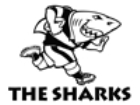 The Sharks surely had their chances but a lack of intensity on attack and defence saw them slump to a humiliating defeat.
The Sharks surely had their chances but a lack of intensity on attack and defence saw them slump to a humiliating defeat.
I would venture that the travel factor -after weeks on the road- played a significant role in this lacklustre performance. They started off well in terms of holding onto the ball but there was never intensity as they took the ball up. They looked flat; no speed onto the ball; sort of just going through the steps right from the start and got even flatter as the match evolved. None of that never say die attitude that the Cheetahs enthralled us with last week against the same opposition.
 This weekend that was I went to a coaching course with a group of players. The course was generally speaking very informative. We rotated through different stations doing basic handling, rucking, tackling and kicking drills with lots of feedback to players and coaches.
This weekend that was I went to a coaching course with a group of players. The course was generally speaking very informative. We rotated through different stations doing basic handling, rucking, tackling and kicking drills with lots of feedback to players and coaches.
At the end we played a game (10 players on each side) called touch and ruck. It is a really nice way to enforce some basic skills at the young age groups. Players learn about maintaining the offside line, to go up in a line on defence and on attack, to touch with both hands (essential to learn that you need to punch through with the arms when you tackle), to rip and place and to clean-out at the rucks.